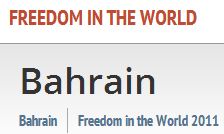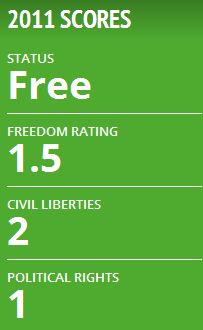David Wearing’s recent ‘Comment is Free’ essay (Bahrain may not be Syria, but that’s no reason for activists to turn a blind eye, May 8th) addresses what he feels is the tendency of nations to deflect criticism about their human rights records by pointing to far worse abuses in other countries.
“One recurring theme in the efforts to deflect criticism of the [The Bahrain Grand Prix] was the line that there are worse places than Bahrain. Sheikh Khalid bin Ahmad Al Khalifa, the regime’s foreign minister, tweeted: “If any here to cover ugly bloody confrontations, go to Syria…”
It didn’t take long, however, for Wearing to pivot to his desired target, Israel.
“The retort…that worse things are happening elsewhere, also happens to be a favourite of the Israeli state and its defenders.
Activists and journalists who draw attention to Israeli human rights abuses are by now well accustomed to hearing this argument being made, sometimes with the accompanying insinuation that Israel is being “singled out” for more sinister reasons.”
Of course, by “sinister reasons” he’s referring to charges that the obsessive critiques of the Jewish state frequently include tropes which recall antisemitic narratives – often regarding the dangerous power of organized Jewry.
A case in point is this Tweet by Wearing himself in January, which was one of several Tweets justifying why Israel is the subject of such intense media focus.

Oh yes, that “huge propaganda campaign”. A nation vigorously defending itself from criticism is, per Wearing and his political fellow travelers, a uniquely Zionist practice.
As I was curious to learn more about this “huge” hasbara subterfuge, I Tweeted him back.

Wearing’s reply:

So, Wearing is among those ‘Comment is Free’ contributors who genuinely believe that Israel is protected from its fair share of criticism (by a “huge propaganda campaign”), and that he is in the vanguard of a brave few who dare challenge Zionist power. Evidently, Wearing hasn’t checked the Guardian’s own data store which would indicate that, far from escaping its fair share of criticism, Israel receives grossly disproportionate coverage at the paper in comparison to other nations.
Turning back to Wearing’s latest essay, he writes:
“There is no serious doubt about the fact that both Israel and Bahrain have very poor human rights records…”
Suggesting a similarity in the human rights records of Bahrain and Israel is simply an unserious proposition. As Freedom House reports year after year, Israel is the only nation in the Middle East listed as democratic and “Free”.
Here’s Freedom House’s evaluation of human rights and freedom in Bahrain. Note, that six is the worse human rights score a country can receive, and one is the best.


Here’s what Freedom House wrote about Bahrain:
“The al-Khalifa family, which belongs to Bahrain’s Sunni Muslim minority, has ruled the Shiite-majority country for more than two centuries.
Bahrain is not an electoral democracy. The 2002 constitution gives the king power over the executive, legislative, and judicial authorities. He appoints cabinet ministers and members of the 40-seat Consultative Council, the upper house of the National Assembly.
formal political parties are illegal,
Freedom of expression is restricted, and the authorities routinely harass activists who criticize them publicly. The government owns all broadcast media outlets, and the private owners of the three main newspapers have close ties to the government. Self-censorship is encouraged by the vaguely worded 2002 Press Law, which allows the state to imprison journalists for criticizing the king or Islam…[emphasis added]
Citizens must obtain a license to hold demonstrations, which are banned from sunrise to sunset in any public arena. Police regularly use violence to break up political protests, most of which occur in Shiite villages.
Bahrain received a [human rights] downward trend arrow due to an intensified crackdown on members of the Shiite Muslim majority in 2010, including assaults and arrests of dozens of activists and journalists, as well as reports of widespread torture of political prisoners.”
And, here’s Freedom House’s rating of Israel’s human rights record:


Freedom House noted the following:
“Israel is an electoral democracy.
Press freedom is respected in Israel, and the media are vibrant and independent. All Israeli newspapers are privately owned and freely criticize government policy.
Freedoms of assembly and association are respected. Israel hosts an active civil society, and demonstrations are widely permitted.
Workers may join unions of their choice and have the right to strike and bargain collectively
The judiciary is independent and regularly rules against the government.
Women have achieved substantial parity at almost all levels of Israeli society.”
Wearing continues:
“Whether states [other than Israel] do worse things is largely beside the point…”
Actually, this is precisely the point: the stunning intellectual failure of many within the activist left (including much of the NGO community) to distinguish between flaws in liberal, democratic states and institutional and systemic human rights violations which infect societies governed by despots and tyrants.
Human Rights Watch founder Robert Bernstein wrote the following in a 2009 NYT essay:
“At Human Rights Watch, we always recognized that open, democratic societies have faults and commit abuses. But we saw that they have the ability to correct them — through vigorous public debate, an adversarial press and many other mechanisms that encourage reform.
That is why we sought to draw a sharp line between the democratic and undemocratic worlds, in an effort to create clarity in human rights. We wanted to prevent the Soviet Union and its followers from playing a moral equivalence game with the West
When I stepped aside in 1998, Human Rights Watch was active in 70 countries, most of them closed societies. Now the organization, with increasing frequency, casts aside its important distinction between open and closed societies.
Nowhere is this more evident than in its work in the Middle East. The region is populated by authoritarian regimes with appalling human rights records. Yet in recent years Human Rights Watch has written far more condemnations of Israel for violations of international law than of any other country in the region.
Only by returning to its founding mission and the spirit of humility that animated it can Human Rights Watch resurrect itself as a moral force in the Middle East and throughout the world.”
While Bernstein was focusing narrowly on Human Rights Watch his commentary is just as apt in addressing how much of the activist left fails to acknowledge the vital distinction between open and closed societies, has abandoned any claim to principled human rights advocacy and has descended into the abyss of moral equivalence.
The question of whether or not the malign obsession with the Jewish state in the media and “human rights” community is motivated by antisemitism can often be a distraction from the larger issue concerning the moral and intellectual seriousness of leftist critiques of Israel.
A left which can’t distinguish between democracies and tyrannies or, at least, routinely engages in rhetorical obfuscations to blur such profound differences, is no longer entitled to claim the mantle of liberalism or progressivism, even narrowly defined.
As such, David Wearing’s recent commentary is a perfect illustration of a dynamic this blog is continually revealing: the Guardian’s abandonment of anything resembling principled liberal thought.
Like this:
Like Loading...

The moral equivalence game: David Wearing’s CiF essay on human rights abuses in Israel & Bahrain
David Wearing’s recent ‘Comment is Free’ essay (Bahrain may not be Syria, but that’s no reason for activists to turn a blind eye, May 8th) addresses what he feels is the tendency of nations to deflect criticism about their human rights records by pointing to far worse abuses in other countries.
It didn’t take long, however, for Wearing to pivot to his desired target, Israel.
Of course, by “sinister reasons” he’s referring to charges that the obsessive critiques of the Jewish state frequently include tropes which recall antisemitic narratives – often regarding the dangerous power of organized Jewry.
A case in point is this Tweet by Wearing himself in January, which was one of several Tweets justifying why Israel is the subject of such intense media focus.
Oh yes, that “huge propaganda campaign”. A nation vigorously defending itself from criticism is, per Wearing and his political fellow travelers, a uniquely Zionist practice.
As I was curious to learn more about this “huge” hasbara subterfuge, I Tweeted him back.
Wearing’s reply:
So, Wearing is among those ‘Comment is Free’ contributors who genuinely believe that Israel is protected from its fair share of criticism (by a “huge propaganda campaign”), and that he is in the vanguard of a brave few who dare challenge Zionist power. Evidently, Wearing hasn’t checked the Guardian’s own data store which would indicate that, far from escaping its fair share of criticism, Israel receives grossly disproportionate coverage at the paper in comparison to other nations.
Turning back to Wearing’s latest essay, he writes:
Suggesting a similarity in the human rights records of Bahrain and Israel is simply an unserious proposition. As Freedom House reports year after year, Israel is the only nation in the Middle East listed as democratic and “Free”.
Here’s Freedom House’s evaluation of human rights and freedom in Bahrain. Note, that six is the worse human rights score a country can receive, and one is the best.
Here’s what Freedom House wrote about Bahrain:
And, here’s Freedom House’s rating of Israel’s human rights record:
Freedom House noted the following:
Wearing continues:
Actually, this is precisely the point: the stunning intellectual failure of many within the activist left (including much of the NGO community) to distinguish between flaws in liberal, democratic states and institutional and systemic human rights violations which infect societies governed by despots and tyrants.
Human Rights Watch founder Robert Bernstein wrote the following in a 2009 NYT essay:
While Bernstein was focusing narrowly on Human Rights Watch his commentary is just as apt in addressing how much of the activist left fails to acknowledge the vital distinction between open and closed societies, has abandoned any claim to principled human rights advocacy and has descended into the abyss of moral equivalence.
The question of whether or not the malign obsession with the Jewish state in the media and “human rights” community is motivated by antisemitism can often be a distraction from the larger issue concerning the moral and intellectual seriousness of leftist critiques of Israel.
A left which can’t distinguish between democracies and tyrannies or, at least, routinely engages in rhetorical obfuscations to blur such profound differences, is no longer entitled to claim the mantle of liberalism or progressivism, even narrowly defined.
As such, David Wearing’s recent commentary is a perfect illustration of a dynamic this blog is continually revealing: the Guardian’s abandonment of anything resembling principled liberal thought.
Like this:
Are Guardian editors guilty of criminal conspiracy?
You may also like
Enforcing the GWV: the Guardian J Street Poll
Georgina Henry's "Cruel Smile"
The national culture of anti-Zionism: The Guardian creates a new kind of British identity